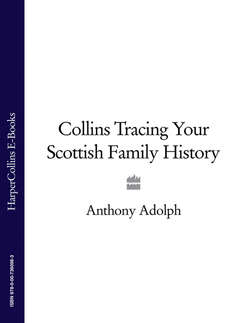Читать книгу Collins Tracing Your Scottish Family History - Ryan Tubridy, Anthony Adolph - Страница 31
Speaking Gaelic
ОглавлениеThe language of the Picts was a dialect of ancient British, akin to modern Welsh. Gaelic, another branch of the same tongue, developed in Ireland and was spoken by Irish settlers (the Scots) in Argyll and up the west coast, especially after the establishment of the Scots kingdom of Dalriada, about the second century AD. It gradually displaced ‘Pictish’ in the west and north. Its decline in the Lowlands was due mainly to the spread of Scots and English in the royal towns or burghs, and after the battle of Culloden in 1746 it began to vanish from the Highlands too. In the 1830s, the Second Statistical Account reports, for far-flung Assynt, Sutherland, that Gaelic was still spoken universally there, ‘…the only medium of religious instruction. The English language, however, is making slow but sure progress. The youth of the parish are ambitious of acquiring it, being sensible that the want of it proves a great bar to their advancement in life. It is likely, nonetheless, that Assynt is one of the very last districts in which the Gaelic language shall cease to be the language of the people.’
Ironically, the Gaelic School Society helped bring Gaelic to an end: once children had learned to read the scripture in Gaelic, the Account says, they wanted to read more on other subjects, and to do this they needed to learn English.
The Vikings’ tongue survives in many words and place names used in the areas they settled, and as a Scots/Norse hybrid, Norn, the native tongue of the Orkneys and Shetlands.
The Scots language – for language it is – is a descendant, along with Northumbrian English, of the tongue of the Anglians of Lothian. It gradually dominated the Lowlands and then pushed northwards, though borrowing words freely from Gaelic, French, Dutch, and English. It was the official tongue of Scotland until 1707. In 1773, Dr Johnson observed that:
‘…the conversation of the Scots grows every day less unpleasing to the English; their peculiarities wear fast away: their dialect is likely to become in half a century provincial and rustick, even to themselves. The great, the learned, the ambitious, and the vain, all cultivate the English phrase, and English pronunciation, and in splendid companies Scotch is not much heard, except now and then from an old lady.’
By writing in Scots, Burns helped save the language from obscurity and helped restore some of its old dignity too. Later writers and poets, such as William Robertson Melvin in the nineteenth century and Hugh MacDairmid in the twentieth century, have contributed to a limited revival. See Scots-English English-Scots Dictionary (Lomond Books, 1998, repr. 2001), The Concise Scots Dictionary (Polygon at Edinburgh, 1999) and an online dictionary, www.dsl.ac.uk/dsl.
